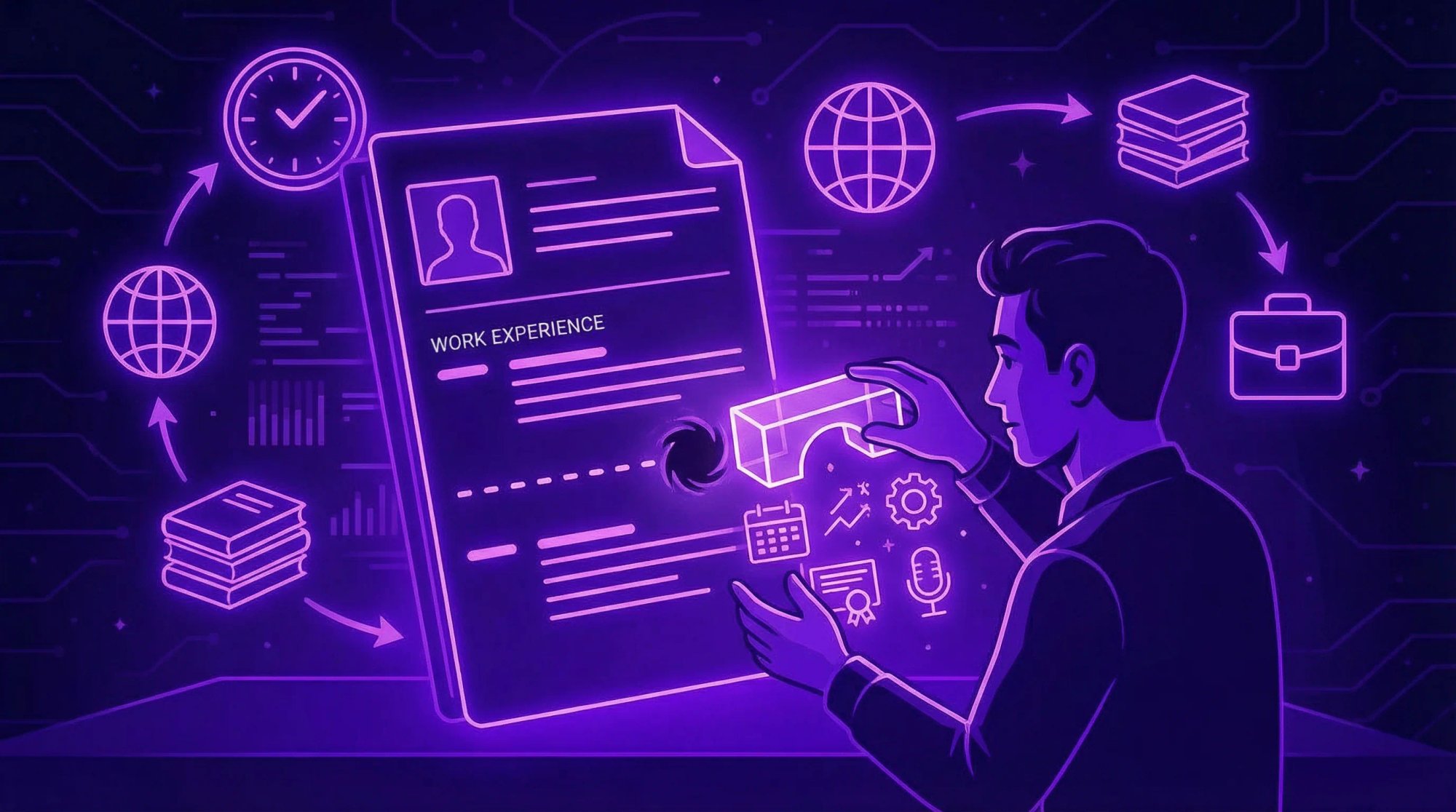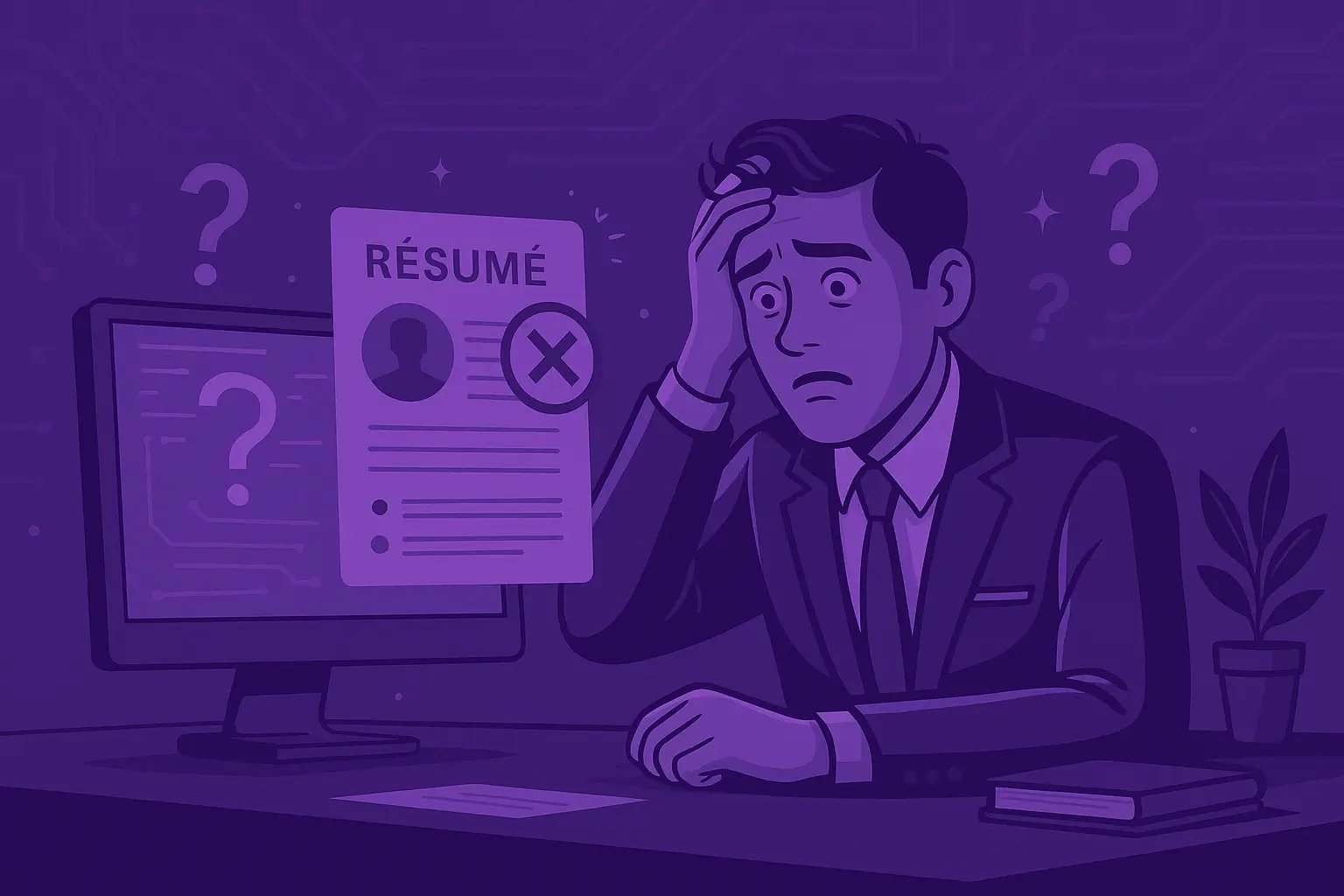Top Entry Level Interview Questions to Prepare for 2025

Stepping into your first professional interview can feel like a high-stakes performance where a few key moments can define the start of your career. The questions seem simple on the surface, but the answers you provide are your primary tool for communicating your true potential. Many talented, qualified candidates falter not from a lack of skill, but from a failure to strategically articulate their value when it matters most. This guide is built to bridge that gap, transforming your preparation from guesswork into a confident, repeatable strategy.
We aren't just listing the most common entry level interview questions; we are deconstructing them. For each one, you will discover the hidden motive behind what hiring managers are really asking. You'll get actionable frameworks and practical examples to help you craft compelling answers that resonate. For an even more extensive compilation, you can consult a comprehensive guide to entry-level interview questions that dives deeper into a wider array of scenarios.
By the end of this article, you will be equipped to walk into any interview room with the tools to not just answer questions, but to tell a powerful professional story and secure the role you deserve.
1. Tell me about yourself
This question isn't just a simple icebreaker; it's your opening act. "Tell me about yourself" is arguably one of the most crucial entry level interview questions because it sets the stage for the entire conversation. It’s your chance to deliver a powerful, concise narrative that connects your past experiences to your future potential with this specific company. A well-crafted response immediately positions you as a thoughtful, prepared, and relevant candidate.
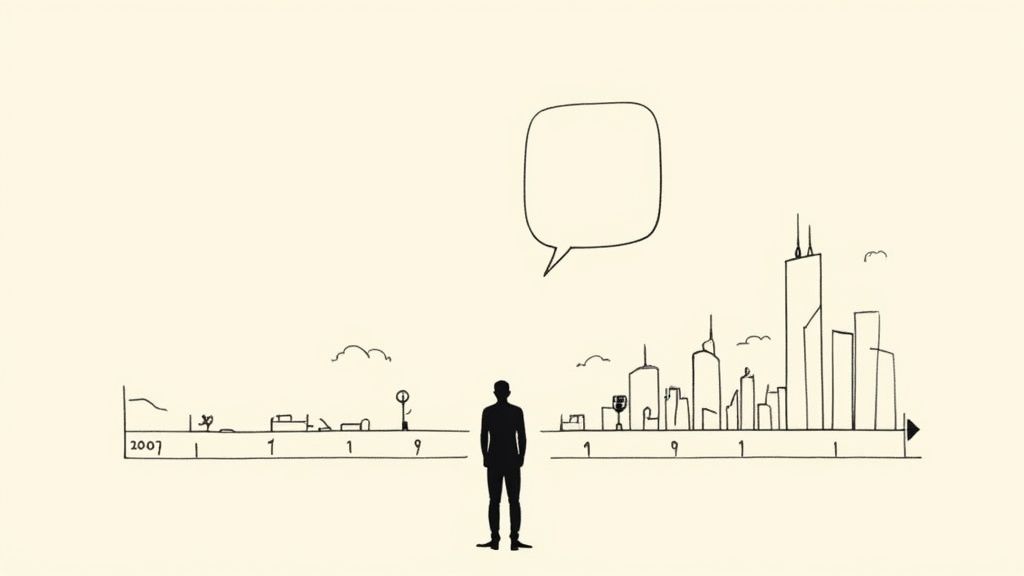
Think of your answer as a verbal highlight reel, not your life story. It should be a 60-to-90-second summary that seamlessly guides the interviewer through your professional journey, culminating in why you are the perfect fit for this role right now.
How to Structure Your Answer
The "Present-Past-Future" model is a foolproof way to organize your thoughts and deliver a compelling story.
- Example: "I recently graduated with a degree in Communications, where I specialized in digital media and completed a capstone project developing a social media strategy for a local nonprofit."
- Example: "During my internship at XYZ Corp, I gained hands-on experience managing content calendars and analyzing engagement metrics, which increased our audience interaction by 15%."
- Example: "I'm eager to apply my skills in a fast-paced, creative environment like yours, and I'm particularly drawn to this Junior Marketing role because it focuses on community building, an area I'm passionate about pursuing."
Pro Tip: Your response to "Tell me about yourself" is essentially a spoken elevator pitch. Mastering this is a game-changer. For more examples and a deeper dive, you can explore how to build the perfect interview elevator pitch.
2. Why do you want to work here?
This question goes beyond your resume to gauge your genuine interest and motivation. When an interviewer asks this, they are filtering out candidates who are just mass-applying from those who have a deliberate interest in their company. It’s a key opportunity to demonstrate that you’ve done your research, you understand their mission, and you see a real connection between your aspirations and their organizational goals. A strong answer proves you're not just looking for any job, but this job.
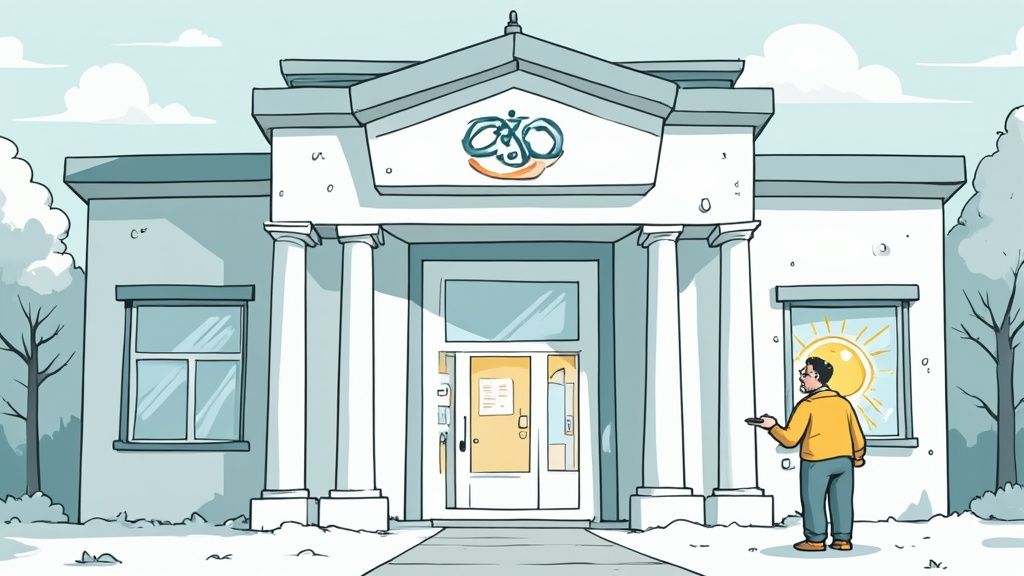
Your response should be a thoughtful blend of praise for the company and a clear link to your own values and career path. This is one of the most important entry level interview questions for showing initiative and demonstrating cultural fit before you've even joined the team.
How to Structure Your Answer
A compelling answer connects your personal values, skills, and goals directly to specific aspects of the company. A simple three-part approach can help you craft a memorable response.
- Example: "I've been following your company's work in sustainable energy for a while, and your recent project on expanding solar farm efficiency is particularly inspiring. I'm passionate about contributing to environmental solutions."
- Example: "My data analysis skills, which I developed during my thesis project on resource allocation, align directly with the needs of this role. I'm excited by the chance to apply them to a cause I truly believe in."
- Example: "The opportunity to learn from industry leaders and grow within a company that is making a real-world impact is exactly what I'm looking for in my next career step."
Pro Tip: Generic answers like "it seems like a great place to work" won't cut it. Your answer must be specific and backed by evidence from your research. To get started, you can find a comprehensive guide on how to research a company before your interview.
3. What are your strengths?
This question is a direct invitation to sell yourself, and it’s one of the most common entry level interview questions you'll face. The interviewer wants to know two things: are you self-aware, and do your key abilities align with the needs of the role? Answering effectively isn't about listing generic traits; it's about providing concrete evidence of the value you bring.
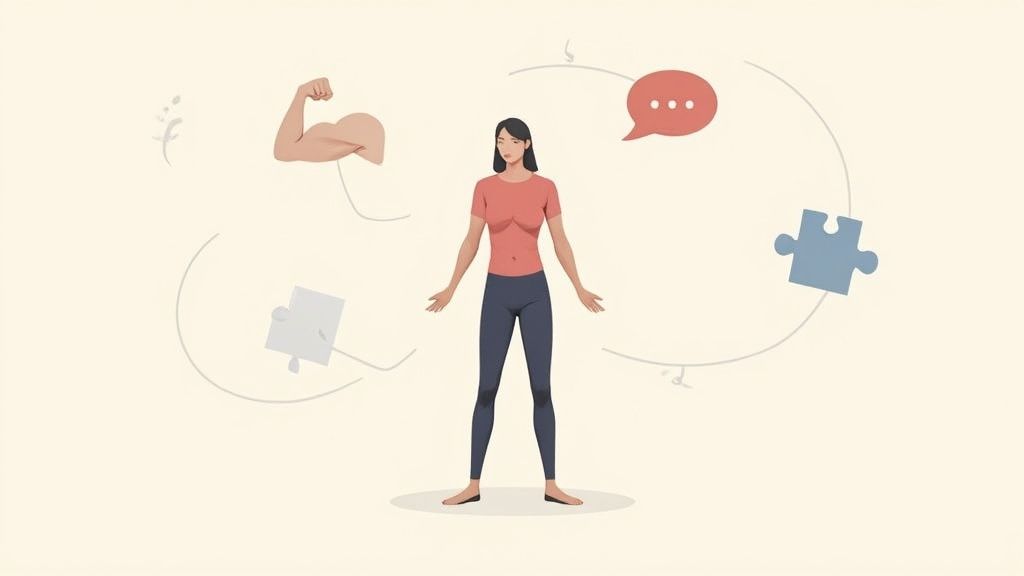
Think of this as your highlight reel for specific skills. You need to connect your abilities directly to the job description, showing the hiring manager exactly how you will contribute to the team’s success from day one. A strategic answer proves you’ve done your homework and understand what the company truly values.
How to Structure Your Answer
The "Claim-Evidence-Benefit" model is a powerful way to frame your response, making it both memorable and impactful. Select two or three strengths that are most relevant to the job.
- Example: "I'd say one of my greatest strengths is my problem-solving ability, especially when it comes to finding more efficient ways to handle complex tasks."
- Example: "In my academic research project on data analysis, my team was struggling with organizing thousands of survey responses. I took the initiative to learn and implement a simple scripting tool that automated the data sorting process, which saved us over 10 hours of manual work."
- Example: "I'm confident I can bring this same proactive and solution-oriented approach to this role to help streamline processes and contribute to the team's overall productivity."
Pro Tip: Avoid clichés like "I'm a hard worker" or "I'm a perfectionist." Instead, focus on tangible skills like adaptability, communication, or technical proficiency backed by real-world examples. This shows, rather than just tells, the interviewer what you’re capable of.
4. What is your biggest weakness?
This question is a test of your self-awareness and integrity. Far from a trap, "What is your biggest weakness?" is one of the most insightful entry level interview questions because it reveals your capacity for growth and your commitment to professional development. Hiring managers aren't looking for flawless candidates; they're looking for honest individuals who can identify areas for improvement and take proactive steps to address them.
Your answer demonstrates maturity and a growth mindset. It shows that you can be introspective, accept constructive feedback, and are dedicated to improving your skills, which are all highly valuable traits in any new hire.
How to Structure Your Answer
A thoughtful and strategic response can turn this tricky question into a major strength. The "Weakness-Action-Result" framework helps you frame your answer positively and professionally.
- Example: "In the past, I sometimes struggled with public speaking, especially when presenting data to larger groups. I would feel nervous, which occasionally impacted the clarity of my delivery."
- Example: "To address this, I joined a public speaking club on campus and volunteered to present our team's findings for several group projects. I also enrolled in an online course focused on data visualization and presentation skills to build my confidence."
- Example: "As a result, I'm now much more comfortable presenting to audiences. I even received positive feedback on my final capstone presentation, where I was able to communicate complex information clearly and effectively."
Pro Tip: The key is to show you are a problem-solver, even when the problem is yourself. Frame your weakness not as a permanent flaw, but as a skill you are actively developing. This approach transforms a potential negative into a story of personal and professional growth.
5. Where do you see yourself in 5 years?
This question feels like a trick, but it's a genuine attempt to understand your career ambitions and see if they align with the company's trajectory. Interviewers use this common entry level interview questions to gauge your foresight, commitment, and whether you view this role as a stepping stone or a foundation. A thoughtful answer shows you've considered your future and see this company as part of it.
Your response should strike a balance between ambition and realism. It needs to demonstrate that you are goal-oriented but also flexible and grounded in the opportunity at hand. The goal is to paint a picture of professional growth that benefits both you and the organization.
How to Structure Your Answer
Frame your five-year plan around learning, contributing, and growing within the company's ecosystem.
- Example: "In the first couple of years, my primary focus would be to become a true expert in this role. I want to fully understand the team's processes, contribute to key projects, and build strong working relationships."
- Example: "As I gain more experience, I see myself taking on more complex challenges. I'm excited by the prospect of developing expertise in [specific area relevant to the company], and I would be eager to mentor new team members or contribute to larger strategic initiatives."
- Example: "By year five, I hope to have made a significant impact on the team's success and be viewed as a go-to person for [a key skill]. I'm motivated by the potential for growth here and would be thrilled to take on greater responsibilities that align with the company's goals."
Pro Tip: Your answer should reflect a clear but adaptable vision. Demonstrating that you've thought about your professional journey shows maturity and drive. For a deeper look at mapping out your professional journey, you can get inspired by this career development plan example.
6. Why are you leaving your current job? / Why did you leave your last job?
This question can feel tricky, but it’s a standard part of most interviews, even for recent graduates. For entry-level candidates, this query is less about a long work history and more about your motivations. Hiring managers ask this among other entry level interview questions to understand your career goals, what you value in a workplace, and to ensure you’re making a deliberate move for positive reasons.
How you frame your departure from an internship, part-time role, or even your transition from academia speaks volumes. A thoughtful, positive response demonstrates professionalism and a forward-looking mindset, assuring the interviewer that you are seeking growth, not just escaping a bad situation. Your goal is to show that this new role is a logical and enthusiastic next step in your career journey.
How to Structure Your Answer
Frame your reason for leaving as a pull toward a new opportunity, not a push away from a negative experience. Keep it concise, positive, and focused on the future.
- Example: "My internship was a fantastic learning experience where I was able to develop foundational skills in data entry and customer service."
- Example: "As I completed my internship, I realized I am eager to apply my skills in a full-time capacity and take on more project ownership, which is a key part of this role."
- Example: "I'm specifically drawn to this position because it offers a clear path for growth in digital marketing and aligns perfectly with my long-term goal of specializing in SEO, which I know is a major focus for your team."
Pro Tip: Never speak negatively about a former employer, manager, or company. It can be interpreted as unprofessional and may make the interviewer wonder if you'll speak poorly of them in the future. Always frame your transition in terms of seeking a better future fit.
7. Describe a challenge you faced and how you handled it
This question goes beyond your resume to uncover your real-world problem-solving skills, resilience, and adaptability. For hiring managers, it's a critical tool among entry level interview questions because it reveals how you think and act under pressure. Your past performance in challenging situations is the best predictor of your future success in navigating the inevitable hurdles of any job.
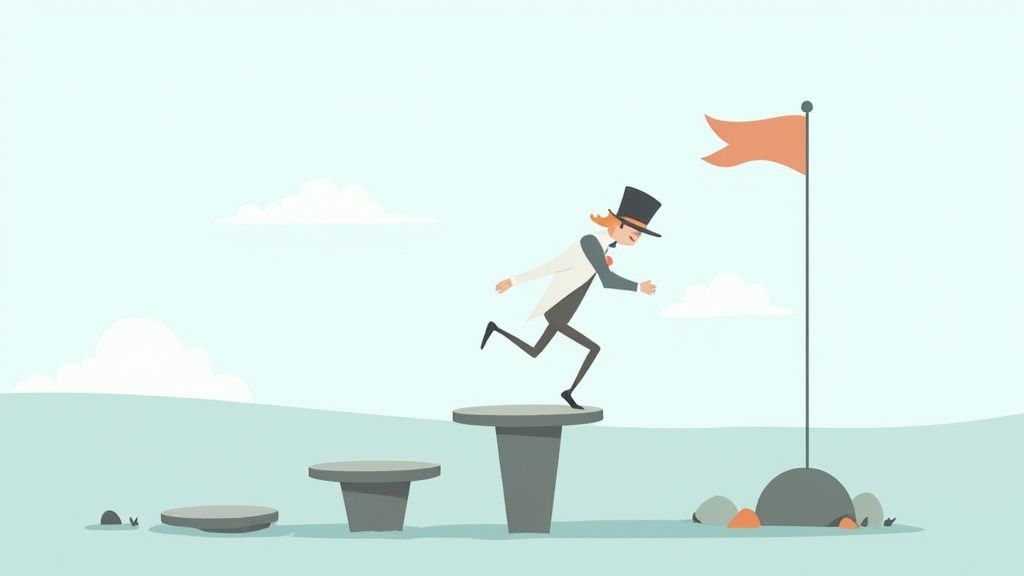
A strong answer demonstrates maturity, resourcefulness, and a proactive mindset. Even if your experience comes from an academic project, internship, or part-time job, you can use this question to prove you have the core competencies needed to thrive in a professional environment.
How to Structure Your Answer
The STAR method is the gold standard for structuring answers to behavioral questions like this one. It ensures your story is clear, concise, and impactful.
- Example: "In my final semester, I was part of a four-person team for a major marketing campaign project. Two weeks before the deadline, one of our key members had to leave the project due to a family emergency."
- Example: "Our task was to re-delegate their responsibilities and complete the project to the original high standard without an extension, which felt overwhelming at first."
- Example: "I immediately organized a team meeting to re-evaluate our timeline and workload. I volunteered to take on the market research portion, which was the most time-sensitive, and created a new shared project plan to track our progress daily."
- Example: "By re-organizing and communicating effectively, we not only submitted the project on time but also received an A. The professor praised our campaign's thorough research, which was the section I had taken over."
Pro Tip: This question is a classic behavioral interview prompt. Having a few different STAR stories prepared is key. For a comprehensive guide, learn more about how to prepare for a behavioral interview.
8. Do you have any questions for me?
This question is not a mere formality; it's a critical part of the interview that many candidates overlook. When a hiring manager asks this, they are testing your engagement, curiosity, and how seriously you're considering the role. Answering "No, I think you've covered everything" is a missed opportunity. This is your final chance to demonstrate your preparation and genuine interest, making it one of the most impactful entry level interview questions you'll face.
A thoughtful question proves you were actively listening and are already thinking like a team member. It transforms the interview from a one-sided interrogation into a two-way conversation, allowing you to gather crucial information to decide if the company is the right fit for you. It's your opportunity to interview them back and leave a lasting, positive impression.
How to Structure Your Answer
The best approach is to have a list of insightful questions prepared beforehand, while also being ready to ask questions that arise during the conversation. Categorize your questions to cover different aspects of the job and company.
- Example: "What does success look like for someone in this position after the first 90 days? What are the key performance indicators?"
- Example: "How would you describe the team's communication and collaboration style? Is it more independent or project-based?"
- Example: "What kind of professional development and training opportunities are available for someone starting in this role?"
Pro Tip: Prepare at least five to seven questions in advance. You may not ask them all, but having options ensures you're ready. For a comprehensive list of impactful inquiries, check out these smart questions to ask hiring managers.
Entry-Level Interview Questions Comparison
Turn Your Preparation into Your Next Opportunity
You’ve now explored the anatomy of the most common entry-level interview questions. From crafting a compelling narrative for "Tell me about yourself" to demonstrating foresight with your five-year plan, you have the blueprint. This isn't just about memorizing answers; it's about building a strategic framework for communicating your value.
The real power behind acing these questions lies in understanding the why. Hiring managers aren't looking for perfect, rehearsed responses. They are searching for authenticity, self-awareness, and a genuine connection to their company's mission. Your goal is to move beyond simply answering the question and start telling a story where you are the protagonist and their company is the next logical chapter.
From Knowledge to Actionable Confidence
Mastering this collection of entry-level interview questions transforms your interview from a stressful interrogation into a dynamic conversation. Each question is a platform, an opportunity to showcase a different facet of your professional identity.
- Your Strengths and Weaknesses: This isn't just a test of honesty; it's a demonstration of your commitment to growth and your ability to self-assess.
- Handling Challenges: This is where you prove your resilience and problem-solving skills, turning past difficulties into evidence of future capability.
- Your Questions: This final step is your chance to pivot from candidate to collaborator, showing you are just as invested in finding the right fit as they are.
Ultimately, preparation is the bridge between potential and performance. The more you internalize these strategies, the more natural and confident you will appear. True confidence doesn't come from knowing what you'll be asked; it comes from knowing you have a compelling, authentic story to tell, no matter the question. With this foundation, you can turn your preparation into tangible action and confidently explore a wide range of job opportunities, knowing you have the tools to succeed.
Your next great role is out there. By investing time in honing your interview skills, you're not just preparing for a single conversation; you're building a core competency that will serve you throughout your entire career. Go forward, tell your story, and turn this preparation into your next big opportunity.
Don't just read about great answers, practice them. AIApply gives you a safe space to rehearse these entry-level interview questions with AI-driven mock interviews and get instant, personalized feedback to sharpen your delivery. Transform your preparation into performance and walk into your next interview with unshakable confidence by visiting AIApply today.
Stepping into your first professional interview can feel like a high-stakes performance where a few key moments can define the start of your career. The questions seem simple on the surface, but the answers you provide are your primary tool for communicating your true potential. Many talented, qualified candidates falter not from a lack of skill, but from a failure to strategically articulate their value when it matters most. This guide is built to bridge that gap, transforming your preparation from guesswork into a confident, repeatable strategy.
We aren't just listing the most common entry level interview questions; we are deconstructing them. For each one, you will discover the hidden motive behind what hiring managers are really asking. You'll get actionable frameworks and practical examples to help you craft compelling answers that resonate. For an even more extensive compilation, you can consult a comprehensive guide to entry-level interview questions that dives deeper into a wider array of scenarios.
By the end of this article, you will be equipped to walk into any interview room with the tools to not just answer questions, but to tell a powerful professional story and secure the role you deserve.
1. Tell me about yourself
This question isn't just a simple icebreaker; it's your opening act. "Tell me about yourself" is arguably one of the most crucial entry level interview questions because it sets the stage for the entire conversation. It’s your chance to deliver a powerful, concise narrative that connects your past experiences to your future potential with this specific company. A well-crafted response immediately positions you as a thoughtful, prepared, and relevant candidate.

Think of your answer as a verbal highlight reel, not your life story. It should be a 60-to-90-second summary that seamlessly guides the interviewer through your professional journey, culminating in why you are the perfect fit for this role right now.
How to Structure Your Answer
The "Present-Past-Future" model is a foolproof way to organize your thoughts and deliver a compelling story.
- Example: "I recently graduated with a degree in Communications, where I specialized in digital media and completed a capstone project developing a social media strategy for a local nonprofit."
- Example: "During my internship at XYZ Corp, I gained hands-on experience managing content calendars and analyzing engagement metrics, which increased our audience interaction by 15%."
- Example: "I'm eager to apply my skills in a fast-paced, creative environment like yours, and I'm particularly drawn to this Junior Marketing role because it focuses on community building, an area I'm passionate about pursuing."
Pro Tip: Your response to "Tell me about yourself" is essentially a spoken elevator pitch. Mastering this is a game-changer. For more examples and a deeper dive, you can explore how to build the perfect interview elevator pitch.
2. Why do you want to work here?
This question goes beyond your resume to gauge your genuine interest and motivation. When an interviewer asks this, they are filtering out candidates who are just mass-applying from those who have a deliberate interest in their company. It’s a key opportunity to demonstrate that you’ve done your research, you understand their mission, and you see a real connection between your aspirations and their organizational goals. A strong answer proves you're not just looking for any job, but this job.

Your response should be a thoughtful blend of praise for the company and a clear link to your own values and career path. This is one of the most important entry level interview questions for showing initiative and demonstrating cultural fit before you've even joined the team.
How to Structure Your Answer
A compelling answer connects your personal values, skills, and goals directly to specific aspects of the company. A simple three-part approach can help you craft a memorable response.
- Example: "I've been following your company's work in sustainable energy for a while, and your recent project on expanding solar farm efficiency is particularly inspiring. I'm passionate about contributing to environmental solutions."
- Example: "My data analysis skills, which I developed during my thesis project on resource allocation, align directly with the needs of this role. I'm excited by the chance to apply them to a cause I truly believe in."
- Example: "The opportunity to learn from industry leaders and grow within a company that is making a real-world impact is exactly what I'm looking for in my next career step."
Pro Tip: Generic answers like "it seems like a great place to work" won't cut it. Your answer must be specific and backed by evidence from your research. To get started, you can find a comprehensive guide on how to research a company before your interview.
3. What are your strengths?
This question is a direct invitation to sell yourself, and it’s one of the most common entry level interview questions you'll face. The interviewer wants to know two things: are you self-aware, and do your key abilities align with the needs of the role? Answering effectively isn't about listing generic traits; it's about providing concrete evidence of the value you bring.

Think of this as your highlight reel for specific skills. You need to connect your abilities directly to the job description, showing the hiring manager exactly how you will contribute to the team’s success from day one. A strategic answer proves you’ve done your homework and understand what the company truly values.
How to Structure Your Answer
The "Claim-Evidence-Benefit" model is a powerful way to frame your response, making it both memorable and impactful. Select two or three strengths that are most relevant to the job.
- Example: "I'd say one of my greatest strengths is my problem-solving ability, especially when it comes to finding more efficient ways to handle complex tasks."
- Example: "In my academic research project on data analysis, my team was struggling with organizing thousands of survey responses. I took the initiative to learn and implement a simple scripting tool that automated the data sorting process, which saved us over 10 hours of manual work."
- Example: "I'm confident I can bring this same proactive and solution-oriented approach to this role to help streamline processes and contribute to the team's overall productivity."
Pro Tip: Avoid clichés like "I'm a hard worker" or "I'm a perfectionist." Instead, focus on tangible skills like adaptability, communication, or technical proficiency backed by real-world examples. This shows, rather than just tells, the interviewer what you’re capable of.
4. What is your biggest weakness?
This question is a test of your self-awareness and integrity. Far from a trap, "What is your biggest weakness?" is one of the most insightful entry level interview questions because it reveals your capacity for growth and your commitment to professional development. Hiring managers aren't looking for flawless candidates; they're looking for honest individuals who can identify areas for improvement and take proactive steps to address them.
Your answer demonstrates maturity and a growth mindset. It shows that you can be introspective, accept constructive feedback, and are dedicated to improving your skills, which are all highly valuable traits in any new hire.
How to Structure Your Answer
A thoughtful and strategic response can turn this tricky question into a major strength. The "Weakness-Action-Result" framework helps you frame your answer positively and professionally.
- Example: "In the past, I sometimes struggled with public speaking, especially when presenting data to larger groups. I would feel nervous, which occasionally impacted the clarity of my delivery."
- Example: "To address this, I joined a public speaking club on campus and volunteered to present our team's findings for several group projects. I also enrolled in an online course focused on data visualization and presentation skills to build my confidence."
- Example: "As a result, I'm now much more comfortable presenting to audiences. I even received positive feedback on my final capstone presentation, where I was able to communicate complex information clearly and effectively."
Pro Tip: The key is to show you are a problem-solver, even when the problem is yourself. Frame your weakness not as a permanent flaw, but as a skill you are actively developing. This approach transforms a potential negative into a story of personal and professional growth.
5. Where do you see yourself in 5 years?
This question feels like a trick, but it's a genuine attempt to understand your career ambitions and see if they align with the company's trajectory. Interviewers use this common entry level interview questions to gauge your foresight, commitment, and whether you view this role as a stepping stone or a foundation. A thoughtful answer shows you've considered your future and see this company as part of it.
Your response should strike a balance between ambition and realism. It needs to demonstrate that you are goal-oriented but also flexible and grounded in the opportunity at hand. The goal is to paint a picture of professional growth that benefits both you and the organization.
How to Structure Your Answer
Frame your five-year plan around learning, contributing, and growing within the company's ecosystem.
- Example: "In the first couple of years, my primary focus would be to become a true expert in this role. I want to fully understand the team's processes, contribute to key projects, and build strong working relationships."
- Example: "As I gain more experience, I see myself taking on more complex challenges. I'm excited by the prospect of developing expertise in [specific area relevant to the company], and I would be eager to mentor new team members or contribute to larger strategic initiatives."
- Example: "By year five, I hope to have made a significant impact on the team's success and be viewed as a go-to person for [a key skill]. I'm motivated by the potential for growth here and would be thrilled to take on greater responsibilities that align with the company's goals."
Pro Tip: Your answer should reflect a clear but adaptable vision. Demonstrating that you've thought about your professional journey shows maturity and drive. For a deeper look at mapping out your professional journey, you can get inspired by this career development plan example.
6. Why are you leaving your current job? / Why did you leave your last job?
This question can feel tricky, but it’s a standard part of most interviews, even for recent graduates. For entry-level candidates, this query is less about a long work history and more about your motivations. Hiring managers ask this among other entry level interview questions to understand your career goals, what you value in a workplace, and to ensure you’re making a deliberate move for positive reasons.
How you frame your departure from an internship, part-time role, or even your transition from academia speaks volumes. A thoughtful, positive response demonstrates professionalism and a forward-looking mindset, assuring the interviewer that you are seeking growth, not just escaping a bad situation. Your goal is to show that this new role is a logical and enthusiastic next step in your career journey.
How to Structure Your Answer
Frame your reason for leaving as a pull toward a new opportunity, not a push away from a negative experience. Keep it concise, positive, and focused on the future.
- Example: "My internship was a fantastic learning experience where I was able to develop foundational skills in data entry and customer service."
- Example: "As I completed my internship, I realized I am eager to apply my skills in a full-time capacity and take on more project ownership, which is a key part of this role."
- Example: "I'm specifically drawn to this position because it offers a clear path for growth in digital marketing and aligns perfectly with my long-term goal of specializing in SEO, which I know is a major focus for your team."
Pro Tip: Never speak negatively about a former employer, manager, or company. It can be interpreted as unprofessional and may make the interviewer wonder if you'll speak poorly of them in the future. Always frame your transition in terms of seeking a better future fit.
7. Describe a challenge you faced and how you handled it
This question goes beyond your resume to uncover your real-world problem-solving skills, resilience, and adaptability. For hiring managers, it's a critical tool among entry level interview questions because it reveals how you think and act under pressure. Your past performance in challenging situations is the best predictor of your future success in navigating the inevitable hurdles of any job.

A strong answer demonstrates maturity, resourcefulness, and a proactive mindset. Even if your experience comes from an academic project, internship, or part-time job, you can use this question to prove you have the core competencies needed to thrive in a professional environment.
How to Structure Your Answer
The STAR method is the gold standard for structuring answers to behavioral questions like this one. It ensures your story is clear, concise, and impactful.
- Example: "In my final semester, I was part of a four-person team for a major marketing campaign project. Two weeks before the deadline, one of our key members had to leave the project due to a family emergency."
- Example: "Our task was to re-delegate their responsibilities and complete the project to the original high standard without an extension, which felt overwhelming at first."
- Example: "I immediately organized a team meeting to re-evaluate our timeline and workload. I volunteered to take on the market research portion, which was the most time-sensitive, and created a new shared project plan to track our progress daily."
- Example: "By re-organizing and communicating effectively, we not only submitted the project on time but also received an A. The professor praised our campaign's thorough research, which was the section I had taken over."
Pro Tip: This question is a classic behavioral interview prompt. Having a few different STAR stories prepared is key. For a comprehensive guide, learn more about how to prepare for a behavioral interview.
8. Do you have any questions for me?
This question is not a mere formality; it's a critical part of the interview that many candidates overlook. When a hiring manager asks this, they are testing your engagement, curiosity, and how seriously you're considering the role. Answering "No, I think you've covered everything" is a missed opportunity. This is your final chance to demonstrate your preparation and genuine interest, making it one of the most impactful entry level interview questions you'll face.
A thoughtful question proves you were actively listening and are already thinking like a team member. It transforms the interview from a one-sided interrogation into a two-way conversation, allowing you to gather crucial information to decide if the company is the right fit for you. It's your opportunity to interview them back and leave a lasting, positive impression.
How to Structure Your Answer
The best approach is to have a list of insightful questions prepared beforehand, while also being ready to ask questions that arise during the conversation. Categorize your questions to cover different aspects of the job and company.
- Example: "What does success look like for someone in this position after the first 90 days? What are the key performance indicators?"
- Example: "How would you describe the team's communication and collaboration style? Is it more independent or project-based?"
- Example: "What kind of professional development and training opportunities are available for someone starting in this role?"
Pro Tip: Prepare at least five to seven questions in advance. You may not ask them all, but having options ensures you're ready. For a comprehensive list of impactful inquiries, check out these smart questions to ask hiring managers.
Entry-Level Interview Questions Comparison
Turn Your Preparation into Your Next Opportunity
You’ve now explored the anatomy of the most common entry-level interview questions. From crafting a compelling narrative for "Tell me about yourself" to demonstrating foresight with your five-year plan, you have the blueprint. This isn't just about memorizing answers; it's about building a strategic framework for communicating your value.
The real power behind acing these questions lies in understanding the why. Hiring managers aren't looking for perfect, rehearsed responses. They are searching for authenticity, self-awareness, and a genuine connection to their company's mission. Your goal is to move beyond simply answering the question and start telling a story where you are the protagonist and their company is the next logical chapter.
From Knowledge to Actionable Confidence
Mastering this collection of entry-level interview questions transforms your interview from a stressful interrogation into a dynamic conversation. Each question is a platform, an opportunity to showcase a different facet of your professional identity.
- Your Strengths and Weaknesses: This isn't just a test of honesty; it's a demonstration of your commitment to growth and your ability to self-assess.
- Handling Challenges: This is where you prove your resilience and problem-solving skills, turning past difficulties into evidence of future capability.
- Your Questions: This final step is your chance to pivot from candidate to collaborator, showing you are just as invested in finding the right fit as they are.
Ultimately, preparation is the bridge between potential and performance. The more you internalize these strategies, the more natural and confident you will appear. True confidence doesn't come from knowing what you'll be asked; it comes from knowing you have a compelling, authentic story to tell, no matter the question. With this foundation, you can turn your preparation into tangible action and confidently explore a wide range of job opportunities, knowing you have the tools to succeed.
Your next great role is out there. By investing time in honing your interview skills, you're not just preparing for a single conversation; you're building a core competency that will serve you throughout your entire career. Go forward, tell your story, and turn this preparation into your next big opportunity.
Don't just read about great answers, practice them. AIApply gives you a safe space to rehearse these entry-level interview questions with AI-driven mock interviews and get instant, personalized feedback to sharpen your delivery. Transform your preparation into performance and walk into your next interview with unshakable confidence by visiting AIApply today.
Don't miss out on
your next opportunity.
Create and send applications in seconds, not hours.






